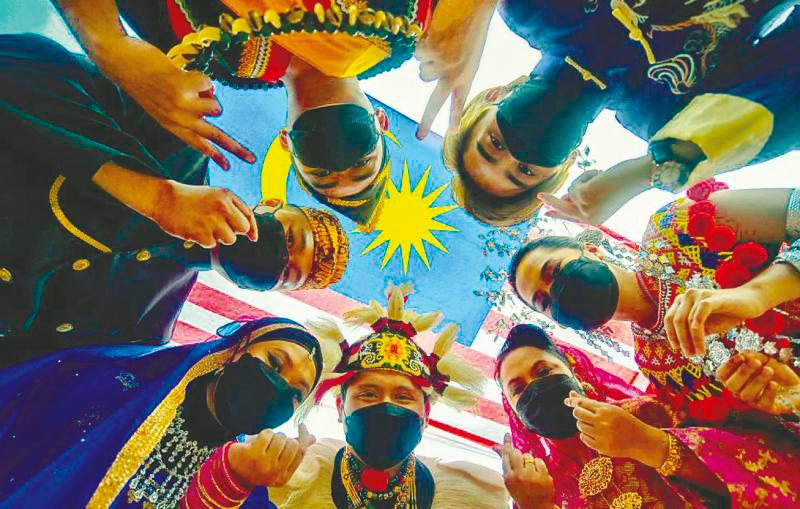IN recent months, there has been a constant reference to the “Three Rs” of race, religion and royalty in Malaysia, highlighting the increasingly polarised ethnic relations in the country.
While these topics provide the cultural dimensions in our daily conversations, they also need to be addressed with care and sensitivity in our multicultural society.
The question that arises is whether Malaysians, after more than 65 years of independence, possess the knowledge and skills to handle racial sensitivities without emotional outbursts.
Adding to the complexity of the situation, one of our former leaders once stated that the Federal Constitution never explicitly proclaimed Malaysia as a multiracial country. This has added confusion to the discussion.
So, how should we describe Malaysia to others? Are we a multicultural society or is one dominant race the defining characteristic of our nation?
Is there a description that can be acceptable to all ethnic groups in the country or are we still uncertain about our Malaysian identity?
If we wish to describe Malaysia as a multicultural society, we must navigate the intricacies of talking about race, religion and royalty in a manner that respects and includes all ethnic groups.
Do all the diverse ethnic communities in the country share a common understanding of what it means to live and coexist in a multicultural society or is this a phrase we have yet to define in terms of form and substance?
Navigating an inclusive path
In light of Prime Minister Datuk Seri Anwar Ibrahim’s vision of building a civilised, skilled and inclusive multicultural society where all ethnic groups will have a place under the Malaysian sun, what role should the rakyat play in supporting him?
With the rising influence of individuals and interest groups in the name of identity politics, racism, bigotry, discrimination and religious extremism, the journey ahead may indeed be an uphill battle.
There will be competing interests, conflicting identities, confusing ideologies and ongoing scepticism along the way.
This challenge has been aggravated by recent incidents related to dress codes, liquor sales, gambling, risque films in local cinemas, foreigners in bikinis in hotel swimming pools, massage parlours, women’s hair salons and rock concerts. These incidents have indicated a lack of understanding of what it takes to present a persona of respect and understanding of the other.
To foster multicultural understanding, it is crucial to recognise and address these issues.
Drawing from studies conducted in multicultural societies, we can identify several key characteristics that Malaysians should develop:
Self-knowledge of culture: Have a deep understanding of our culture, values and beliefs, and be able to describe them to others.
Understanding other cultures: Recognise the values, beliefs, underlying assumptions and typical behaviour of Malaysians from different ethnic groups beyond book learning.
Cross-cultural knowledge: Understand the histories, heroes, traditions, customs and social institutions of other ethnic groups when making decisions.
Respect for diversity: Show consideration for the cultures of others and be willing to influence one’s value system.
Empathy and perspective: Approach issues from the perspective of more than one ethnic group to develop a deeper understanding.
Acknowledging contributions: Acknowledge the historical contributions of all ethnic groups to the country’s development.
To be truly inclusive in the context of a multicultural society, we must possess a repertoire of appropriate skills and be sensitive to the nuances, manners, observations and restrictions when we communicate with fellow Malaysians.
The potential danger we face is when we are comfortable interacting only at the intracultural level – within our ethnic group.
We must avoid imposing our values and beliefs on others without understanding their sensitivities. Our challenge is to ensure that when we make decisions and interact with fellow Malaysians, we are aware of the values and sensitivities of others.
In moving forward, each of us must find ways to promote the value of inclusivity in the spirit of muhibbah dan bertolak ansur (goodwill and tolerance), based on knowledge and understanding of the cultural values and hidden assumptions of the various cultures in the country.
Goodwill through coexistence
A true Malaysian should embody compassion (ihsan) and respect (hormat) and not be perceived as ignorant and arrogant, especially when dealing with diversity. After all, diversity is a source of creativity and innovation (daya cipta).
As mentioned in Surah Al Hujurat (49:13), “O mankind, we have created you all from a male (Adam, the foremost father) and a female (Eve, the foremost mother) and formed you into nations and tribes so that you may recognise one another. The noblest among you with God is most conscious and fearful of Him. God is All-Knowing and All-Informed.”
This verse carries a profound implication for our multicultural society: the purpose of diversity is to “know each other”, to learn from one another and not to despise one another for our differences.
Embracing multiculturalism requires respecting the values and sensitivities associated with all ethnic groups in Malaysia.
We need to strive for accuracy in our judgements based on our understanding of the complexities and sensitivities of the situation.
If this principle had been observed, the recent incidents mentioned earlier would have been better managed in the true spirit of muhibbah (goodwill through coexistence).
In conclusion, fostering multicultural understanding in Malaysia is not merely a noble aspiration but a pressing necessity for the country’s future.
This endeavour requires an unwavering commitment to respecting, embracing and celebrating the rich diversity that defines Malaysia.
By developing intercultural skills, empathy and a shared commitment to unity, Malaysians can lead the way in building a society that thrives on the strength of its multicultural fabric.
This journey may be challenging, but the rewards are a harmonious, inclusive and prosperous Malaysia, where every citizen can find their place under the Malaysian sun.
The writer is an interculturalist. Comments: letters@thesundaily.com









